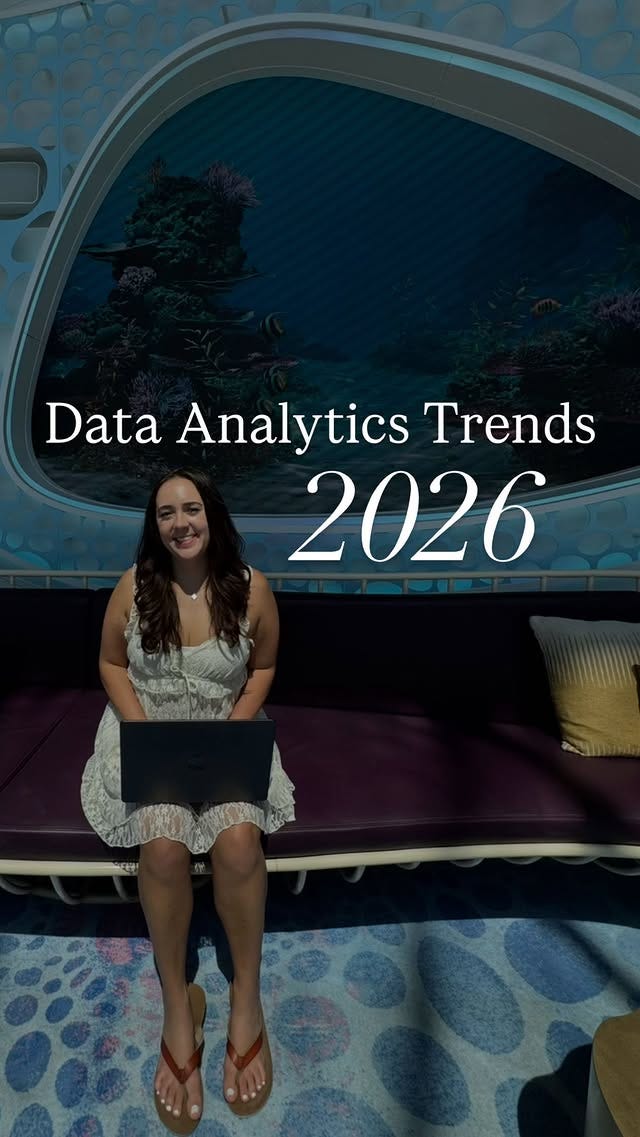Future of Data Analytics: Trends you MUST know in 2026
Adapt or be left BEHIND! 😡
Got BDE?⚡️
If you wanna support my newsletter and click rates, please CLICK A LINK somewhere in here ❤️ And subscribe on YouTube 🎥— I just hit 5K subs 🎉
The Future of Data Analytics: Trends you MUST know in 2026
The world of data analytics is moving FAST 🔗. By 2026, professionals won’t just be cleaning data and building drag & drop dashboards— they’ll be expected to leverage AI tools, engineer analytical pipelines, define business logic through code, and prove their value through real‑world projects rather than certificates. The video below breaks it down in depth ⬇️
Here are the 3 major trends I’m seeing in data analytics going into 2026:
1. AI‑Driven Analytics
AI is becoming a built‑in feature in everything from spreadsheets to visualization tools. ChatGPT, Claude, GitHub Copilot, and other AI assistants are already helping analysts write queries, interpret results, and generate insights more quickly and accurately than ever. In just a couple of years, companies will expect their data teams to fully embrace and implement these tools into workflows rather than just see them as novelties (or competition😂). Analysts who learn to drive results, automate tedious tasks, and add insights to their own judgement with AI will be the most valuable on the job market. Those who don’t adopt AI will be left behind and become irrelevant very quickly on the job market!
2. Analytics Engineering
The days when data analysts were praised for their ability to drag and drop charts into a dashboard are OVER. Nowadays companies want analytics engineers who can manage an analytical pipeline and define business logic for reporting. They’re looking for people who can build and maintain data models, implement business logic into code and data, and QA the results on a deeper level. This more technical role sits between data engineering and analytics and requires fluency in SQL 🔗. Many AE roles also require skills in Python and dbt— which I believe will explode even more next year. The most sought‑after analysts will be those who can design data transformations and automate reporting rather than just visualize outputs. TLDR: companies will want all analysts to be able to code and do technical work.
3. Certificates are losing their weight
Basic certificates used to be a golden ticket into 6-figure analytics roles because no one had them, and they were enough to impress hiring managers. But many of these programs teach outdated tools like R or proprietary software, and these don’t match the technologies companies actually use in industry. Employers care about proven skills and hands‑on experience way more than a shiny certificate with no backbone. Data Analytics portfolios, personal projects, and work experience speak louder than certificates, and this will only increase next year. Hiring managers are going to value projects and practical knowledge over the number of courses and certifications you’ve taken. So stop taking 100 different certificates and start practicing!
What to do about it?
In 2026, data analytics will be more intertwined with AI, engineering, and real‑world problem solving than it ever has before. To stay relevant, start experimenting with AI tools today, invest in your technical skills, and build projects that showcase what you can actually do. The future is bright— but only for those who level up and adapt with the times.
Keep that BDE rolling into next year 💅🏼
Jess Ramos 💕
⚡️If you’re new here:
💁🏽♀️ Who Am I?
I’m Jess Ramos, the founder of Big Data Energy and the creator of the BEST SQL course and community: Big SQL Energy⚡️. Check me out on socials: 🔗YouTube, 🔗LinkedIn, 🔗Instagram, and 🔗TikTok. And of course subscribe to my 🔗newsletter here for all my upcoming lessons and updates— all for free!






Sadly, some of these problems that you describe have existed for years.
Even all the way back in 2017, the big challenge for companies was hiring people who could build the infrastructure for data analytics and data science (mostly data engineers), so that data analysts could use it. There was a push to move from data analytics to data engineering around 2019-2020, with lots of "Dashboard experts" positions disappearing already back then.
To me, the real problem is not about technical skills; it's about the fact that we're missing good translators between the business and data teams, and not addressing the problem of understanding "What decisions are we trying to support," but instead, rushing to crunch more and more data because we may or may not need it. It's causing a lot of frustration to the current workforce, and quite frankly, I do not see AI helping with this specific area.
I'm addressing this area in my Substack about decision intelligence products, an approach that starts with the decision and moves to the solution, rather than beginning with the data first. I'd love to see more organizations going in that direction, rather than pushing more people to become data engineers and clean more data that they may not even need.
https://signaltoproduct.substack.com/
While DA might be slowly becoming commoditized with AI, I still see a lot of value in Business Analysts.